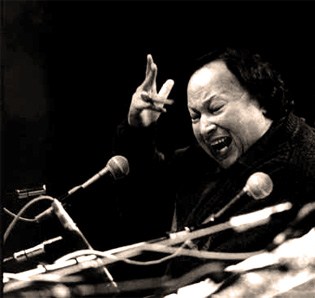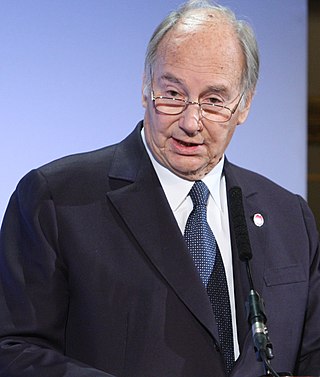(March 2024) |
| Personal information | |
|---|---|
| Born | 1 August 1989 Sialkot, Pakistan |
Source: Cricinfo, 12 November 2015 | |
Ali Shamsher Khan (born 1 August 1989) is a Pakistani first-class cricketer who played for Sialkot cricket team. [1]
(March 2024) |
| Personal information | |
|---|---|
| Born | 1 August 1989 Sialkot, Pakistan |
Source: Cricinfo, 12 November 2015 | |
Ali Shamsher Khan (born 1 August 1989) is a Pakistani first-class cricketer who played for Sialkot cricket team. [1]

Ustad Nusrat Fateh Ali Khan, also known by his initials NFAK, was a Pakistani singer, songwriter, and music director. He was primarily a singer of qawwali, a form of Sufi devotional music. Often referred to as the "Shahenshah-e-Qawwali", he is considered by The New York Times as the greatest qawwali singer of his generation and as the fourth greatest singer of all time by LA Weekly in 2016. He was known for his vocal abilities and could perform at a high level of intensity for several hours. Khan is widely credited with introducing Qawwali music to international audiences. He was also a master of Hindustani classical music.

Aga Khan is a title held by the Imām of the Nizari Ismāʿīli Shias. Since 1957, the holder of the title has been the 49th Imām, Prince Shah Karim al-Husseini, Aga Khan IV. Aga Khan claims to be a direct descendant of Muhammad, the last prophet according to the religion of Islam.

Liaquat Ali Khan was a Pakistani lawyer, politician and statesman who served as the first prime minister of Pakistan from 1947 until his assassination in 1951. He was as pivotal to the consolidation of Pakistan as the Quaid-i-Azam, Muhammad Ali Jinnah, was central to the creation of Pakistan. He was one of the leading figures of the Pakistan Movement and is revered as Quaid-e-Millat and later on as "Shaheed e Millat".

Ali Akbar Khan was an Indian Hindustani classical musician of the Maihar gharana, known for his virtuosity in playing the sarod. Trained as a classical musician and instrumentalist by his father, Allauddin Khan, he also composed numerous classical ragas and film scores. He established a music school in Calcutta in 1956, and the Ali Akbar College of Music in 1967, which moved with him to the United States and is now based in San Rafael, California, with a branch in Basel, Switzerland.

The Second Anglo-Afghan War was a military conflict fought between the British Raj and the Emirate of Afghanistan from 1878 to 1880, when the latter was ruled by Sher Ali Khan of the Barakzai dynasty, the son of former Emir Dost Mohammad Khan. The war was part of the Great Game between the British and Russian empires.

Fath-Ali Shah Qajar was the second Shah of Qajar Iran. He reigned from 17 June 1797 until his death on 24 October 1834. His reign saw the irrevocable ceding of Iran's northern territories in the Caucasus, comprising what is nowadays Georgia, Dagestan, Azerbaijan, and Armenia, to the Russian Empire following the Russo-Persian Wars of 1804–1813 and 1826–1828 and the resulting treaties of Gulistan and Turkmenchay. These two treaties are closely tied to Fath-Ali Shah's legacy amongst Iranians, who often view him as a weak ruler.

Ustad Bade Ghulam Ali Khan was an Indian vocalist, from the Kasur Patiala Gharana.

Saif Ali Khan is an Indian actor and film producer who primarily works in Hindi films. The current head of the Pataudi family, he is the son of actress Sharmila Tagore and cricketer Mansoor Ali Khan Pataudi. Khan has won several awards, including a National Film Award and seven Filmfare Awards, and received the Padma Shri, the fourth highest Indian civilian award in 2010.

Rahat Fateh Ali Khan is a Pakistani singer, primarily Qawwali, a form of Sufi devotional music. Khan is one of the most popular and highest paid singers in Pakistan. He is the nephew of Nusrat Fateh Ali Khan, son of Farrukh Fateh Ali Khan and grandson of Qawwali singer Fateh Ali Khan In addition to Qawwali, he also performs ghazals and other light music. He is also well-known as a playback singer in Hindi cinema and the Pakistan film industry.

Ustad Bade Fateh Ali Khan (Urdu: بڑے فتح علی خان; was among the foremost Khyal vocalists in Pakistan, and a leading exponent of the Patiala Gharana tradition of music. He was the younger of the legendary singing duo Amanat Ali and Fateh Ali, who enjoyed immense prestige and success across the subcontinent and beyond until the sudden and unexpected death of Ustad Amanat Ali Khan in 1974. For his contributions to classical music, Fateh Ali was honoured with the highest national literary award of Pakistan — the Pride of Performance — by the President of Pakistan in 1969.

Soha Ali Khan Pataudi is an Indian actress who has worked in Hindi, Bengali, and English films. She is the younger daughter of veteran actress Sharmila Tagore and former India cricket captain Mansoor Ali Khan, of Bhopal, and the younger sister of actor Saif Ali Khan. She started her acting career with the romantic comedy film Dil Maange More (2004), and is best known for her role in the drama film Rang De Basanti (2006). In 2017, she authored a book The Perils of Being Moderately Famous that won the Crossword Book Award in 2018.
Fateh Ali Khan Jullundhri Qawwal was a classical singer and a qawwali musician in the 1940s and 1950s.

Ustad Amjad Ali Khan is an Indian classical sarod player, best known for his clear and fast ekhara taans. Khan was born into a classical musical family and has performed internationally since the 1960s. He was awarded India's second highest civilian honor Padma Vibhushan in 2001, India's third highest civilian honor Padma Bhushan in 1991 and Padma Shree in 1975.

Ustad Amanat Ali Khan was a Pakistani classical vocalist from the Patiala gharana tradition of music and is widely regarded as one of the finest classical and ghazal singers of all time. Together with his younger brother, Ustad Bade Fateh Ali Khan, he formed a famed singing duo that garnered widespread popularity across the Indian subcontinent. For his contributions to classical music, Amanat Ali was honoured with the highest national literary award of Pakistan – the Pride of Performance – by the President of Pakistan in 1969. Khan was especially noted for khayal, thumri, and ghazal styles of singing and has been described as "the maestro of the Patiala gharana." He stands with singing icons like Mehdi Hassan and Ahmed Rushdi, having left behind a legacy of hundreds of classical and semi-classical songs.
Sham Chaurasi Gharana is a vocal gharana in Hindustani classical music known for the singing of vocal duets. It is also known as the cradle of drupad. It is one of the four singing gharanas of Punjab; the other three are: Patiala, Talwandi and Kapurthala. It is most notably represented in modern times by the brothers Nazakat and Salamat Ali Khan.
Ustad Hamid Ali Khan is a Pakistani classical singer. He belongs to the Patiala gharana. Being a representative of the Patiala gharana, Hamid Ali Khan is an exponent of ghazal and classical singing. He has released several records and performed with other famous Indian artists. He has also collaborated with many UK-based artists, some of the recent ones being Partha Sarathi Mukherjee (tabla) and Fida Hussain (harmonium).

Nawab Mohammad Mansoor Ali Khan Pataudi was an Indian cricketer and a former captain of the Indian cricket team.

The siege of Jinji,, began when the Mughal Emperor Aurangzeb appointed Zulfiqar Ali Khan as the Nawab of the Carnatic and dispatched him to besiege and capture Jinji Fort, which had been sacked and captured by Maratha Empire troops led by Rajaram, they had also ambushed and killed about 300 Mughal Sowars in the Carnatic. The Mughal Emperor Aurangzeb then ordered Ghazi ud-Din Khan Feroze Jung I to protect the supply routes leading to Jinji Fort and to support and provide reinforcements to Zulfiqar Ali Khan when needed.

Sara Ali Khan Pataudi is an Indian actress who works in Hindi films. Born into the Pataudi family, she is the daughter of actors Amrita Singh and Saif Ali Khan. After graduating with a degree in history and political science from Columbia University, Khan began her acting career in 2018 with the romantic drama Kedarnath and the action comedy Simmba. Both films were commercially successful, and the former earned her the Filmfare Award for Best Female Debut.